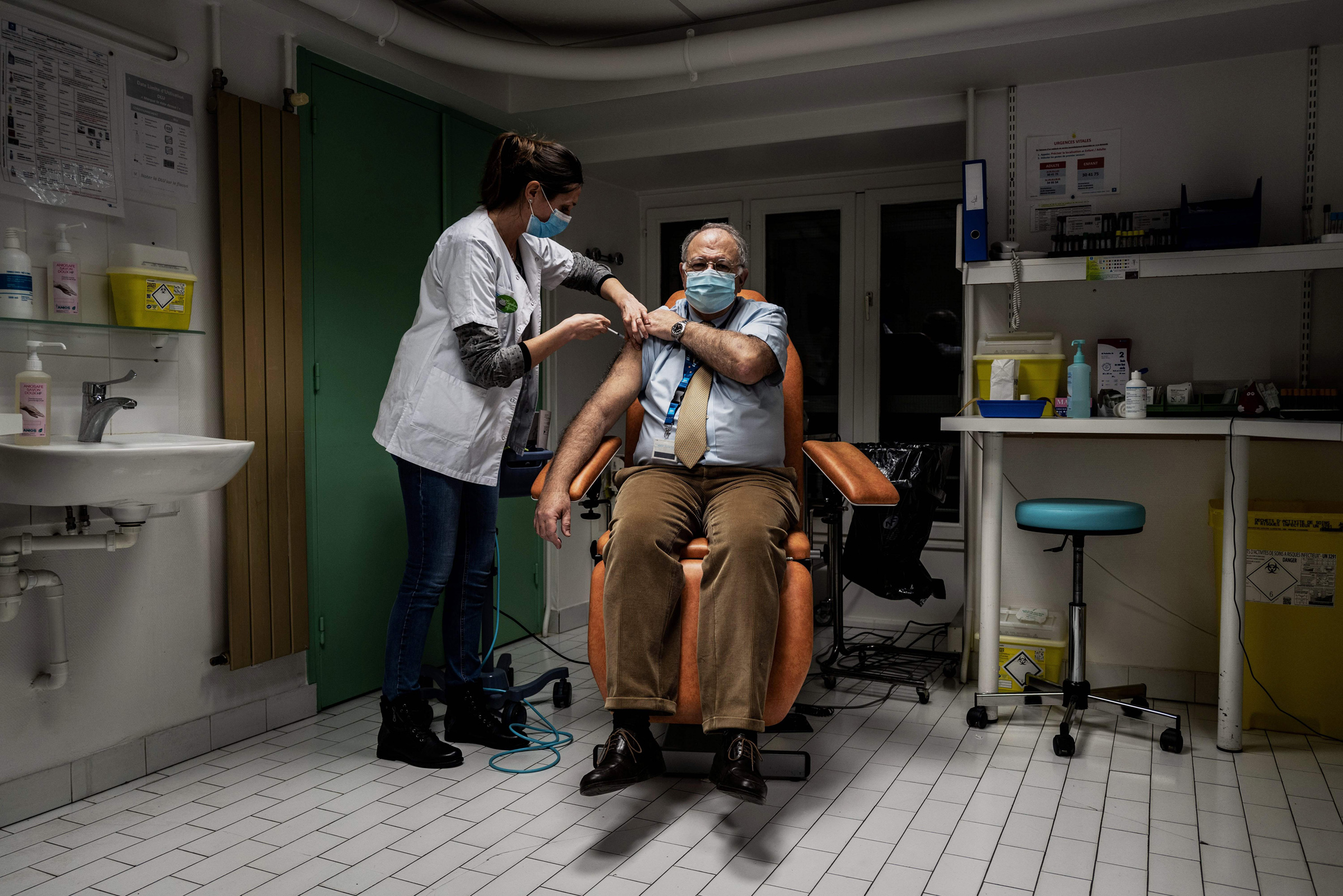
The threat was clear: Pinned to the door of a medical clinic in the small town of Fronton in south-west France in late January, the page said health professionals who discuss COVID-19 on television were turning the country into a giant drug dispensary, and that “silencing them is a matter of public health.” Underscoring the message at the bottom was a chilling drawing: Two nooses.
To the clinic physician Dr. Jerôme Marty, this was just one more nerve-racking moment during months of harassment leveled against him for supporting lockdowns, masking—and now vaccines. “People call me and say: ‘We are coming to your house, and we are going to skin you alive,’” says Marty, who as president of the country’s National Union of Independent Doctors has become a regular guest on French television. He says the threats have grown increasingly personal against himself and many other doctors who share similar views. “They post pictures of my home online,” he says.
In the race to vaccinate its populations, the European Union has fallen behind both the United States and the neighboring United Kingdom. As of Feb.14, the E.U. had administered 4.9 doses per 100 residents, vs 16 doses in the U.S. and 23.7 in the U.K. Blame for what has gone wrong can be assigned to any number of individuals and organizations, but one clearcut failure was the E.U.regulator’s sluggish effort to approve and purchase vaccines for its 27 nations.
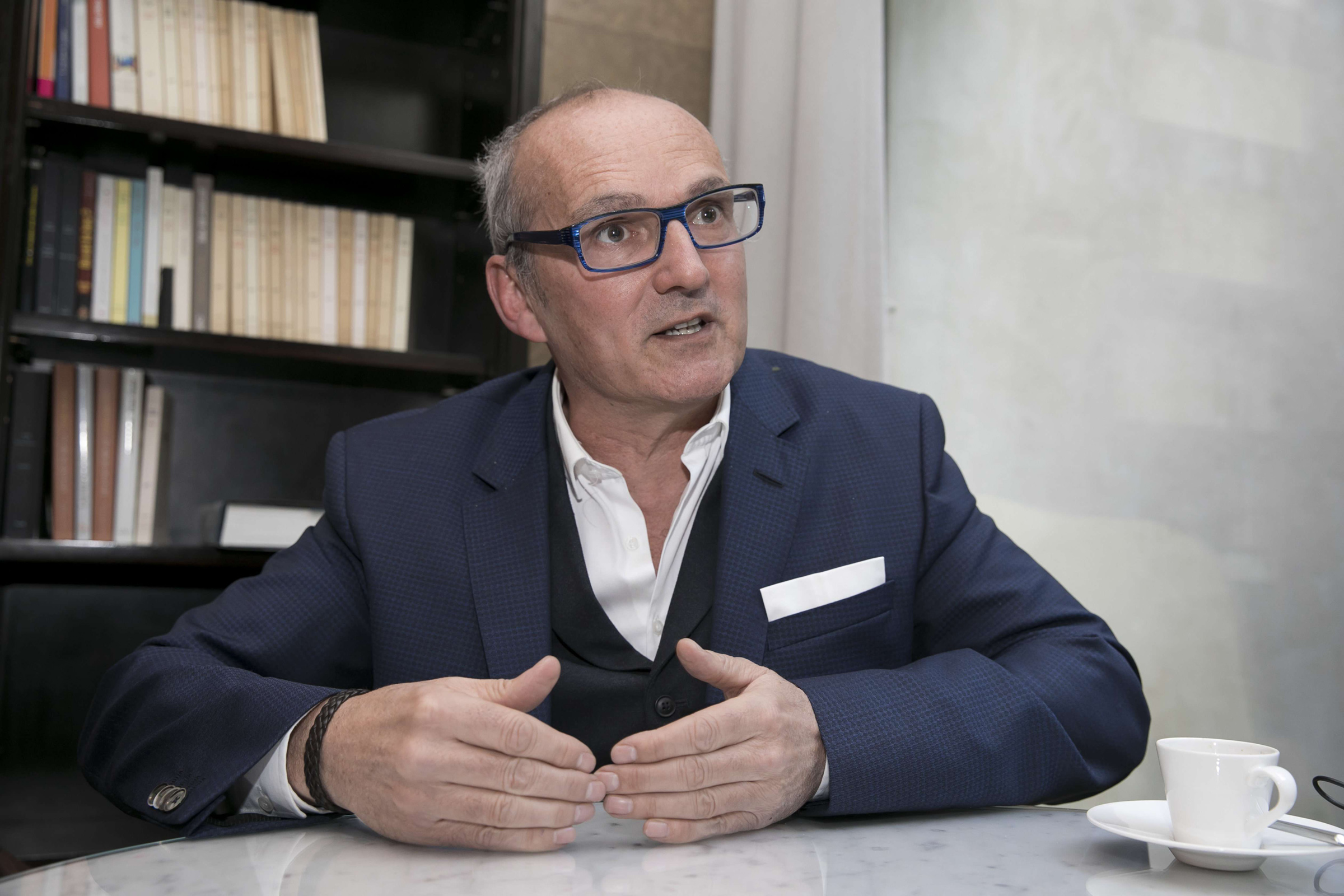
Perhaps most striking of all has been the poor performance of France, which has long touted its first-rate public health. About 2.3 million French have so far been given a COVID-19 shot, out of 66 million people. That’s far less than the 15.3 million people in the U.K., with roughly the same population.
There is one major factor that helps explain the snail’s pace of France’s vaccine program: Widespread distrust, and even hostility, among millions of French towards vaccines in general, but specifically towards the new generation of shots currently being rolled out. In an October poll of 18,000 people across the world, France was the most reluctant out of 15 countries to get a hypothetical COVID-19 vaccine, with only 54% of French willing to be immunized, were a shot to be approved. Anti-vaccine sentiment has eased worldwide as the drugs have been rolled out—but only slightly in France. In a Kantar Public poll this month, over one-third (37%) of French said they would definitely or probably not get vaccinated, compared with 26% in the U.S., 23% in Germany and just 14% in the U.K. The strongest anti-vaccine feeling in France was among those in their 20s.
Among the French skeptics, a core of hardline anti-vaxxers has now seized on the pandemic as its line in the sand. In numerous interviews with TIME over the past week, doctors, scientists, and pro-vaccine activists describe months of relentless trolling and verbal abuse. No health professional has been physically attacked, yet. But the rise in extremist views is unmistakable. “We have seen for the past year the growth of a movement of people who are anti-mask, anti-vaccine, they see it as a conspiracy,” says Marty, the doctor in Fronton in south-west France. “They have begun to threaten doctors.”
The militant anti-vaccine movement
Back in 2017, long before “coronavirus” became a household term, French President Emmanuel Macron’s government was considering increasing the number of immunizations children required in order to attend school, sparking outrage from many parents. A number of concerned citizens set up a Facebook group, Les Vaxxeuses, in order to rebut their often erroneous or misleading claims. When the mandatory vaccines increased from three to 11 vaccines in 2018, Les Vaxxeuses began countering anti-vaccine arguments on social media, and in the comments sections of news sites, using scientific data.
During the pandemic, Lex Vaxxeuses has intensified its work and gained a new public profile—it now has over 25,000 followers, and its savvy pro-vaccine memes are widely shared. That work has opened a flood of verbal assaults against them, which has grown more vicious in recent months, as the COVID-19 vaccines have begun to roll out. In an interview on an encrypted call, three of the group’s moderators said they had decided to remain anonymous when they launched in 2017, fearing verbal, and maybe physical, attacks. But this was worse than anything they anticipated; among text and Facebook messages seen by TIME are several threatening Les Vaxxeuses members with long-range rifle shots, others suggesting sexual assault, and one saying the group’s members deserve maximum-security prison for endangering people’s lives.
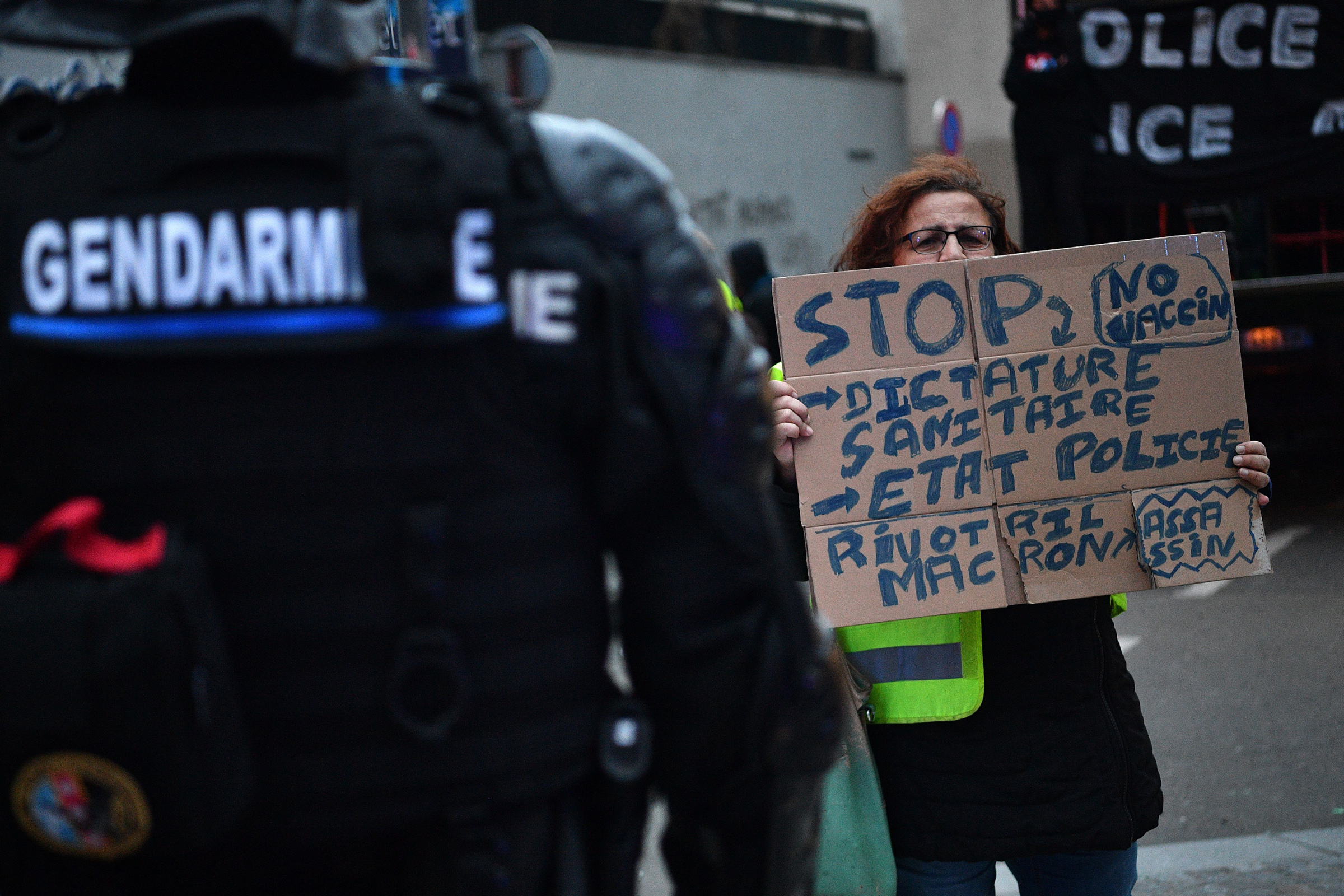
On the group’s encrypted call with TIME, a middle-school teacher who asks to be identified only as Anna says she has isolated herself from colleagues, and doesn’t dare to express her pro-vaccine views at work. “Some of the other teachers are anti-vaxxers, and every time someone says anything about vaccines, they are very aggressive,” she says. “They say it is crap, that it is to kill us. Every time we meet in the restroom, they look at me very, very angrily.” When I ask Anna how fellow teachers might respond to her involvement in Les Vaxxeuses, she says, “I do not want to imagine what would happen.”
She says her teenage students seem to have absorbed their teachers’ anti-vaccine views. The youth voice a range of fears and suspicions, including that the COVID-19 vaccines are simply a money-making scheme by the pharmaceutical industry or “Big Pharma,” a phrase widely used (in English) in France. “Kids are frightened,” Anna says. “They ask if it is true that we will have microchips in our vaccines. It is a nightmare.”
Anti-vaccine sentiment was high in France before COVID-19, in part the legacy of major French health scandals, including donor blood found to have been contaminated with the AIDS virus in the 1990s; a furor, also in the 1990s, over a supposed link between Hepatitis B vaccines and autism, which has been disproven; and millions of euros spent needlessly on H1N1 flu vaccines in the late 2000s.
Trust in Macron’s government was also eroded after it made some serious missteps when the COVID-19 pandemic hit (though they were hardly alone). The government first told the French public that facial masks were useless; in fact, a previous administration had destroyed the national stockpile of a billion masks. It also said only those with symptoms needed tests; in reality, the government wanted to limit the number of people seeking tests because testing labs were drastically short of supplies. Coronavirus survivors have sued the government for bungling the crisis, with charges that could land Prime Minister Jean Castex up to two years in jail if the case goes to trial and he is convicted.
Now that vaccines are here, many French doubt their government’s word can be trusted. “There is a really, really strong link between skepticism of the vaccine, and distrust of political institutions,” says Antoine Bristielle, a researcher with the Jean-Jaurès Foundation in Paris, who has conducted several polls on vaccine views. “We have a very, very high level of political distrust,” he says.
So when the government began rolling the vaccines out, it did so tentatively. Only one French politician—Health Minister Olivier Véran—has been vaccinated live on television, unlike the dozens of senior political figures who have done so in the U.S. For weeks, the French government allowed only doctors—and not nurses or pharmacists, for example—to administer COVID-19 vaccines. The first recipients were senior citizens in nursing homes, who were given a five-day reflection period to confirm their choice. “A lot of people are fiercely against vaccines,” says Françoise Salvadori, an immunology researcher at France’s University of Burgundy, and author of a book on vaccine skepticism. “It explains the government’s very prudent plan. The health minister is walking on eggshells.”
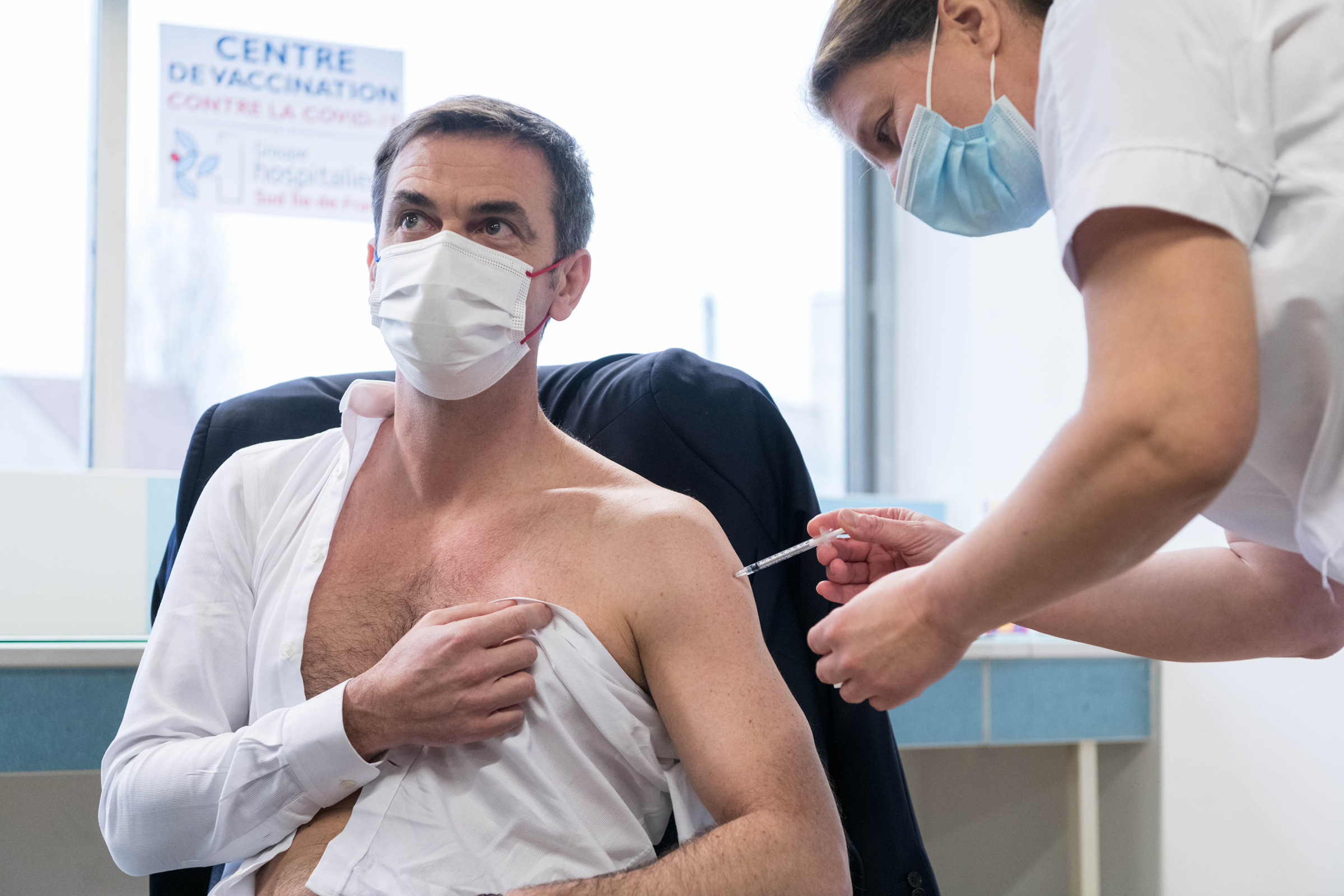
But that caution seems to have backfired, as millions of French now wonder why other countries’ vaccine programs are working so much better than theirs. “Macron overestimated the anti-vaxx trend in France,” says Karine Lacombe, head of infectious diseases at Saint-Antoine Hospital in Paris. “The government was really afraid of promoting the COVID vaccine, in case there were problems, and they would be held responsible.”
Down with Big Pharma
Far-right leaders like Florian Philippot, head of Les Patriotes party, which wants France to leave the E.U., have fueled the rising anti-vaccine feeling, through weekend demonstrations outside the Health Ministry; 11 rallies are planned across France on Feb. 20. On stage, and on television, Philippot denounces Macron’s “coronafolie,” or corona madness, and rails against lockdowns and possible vaccination passports. His message appears to have caught on, as those supporting widespread COVID-19 vaccines are cast as a tool of Big Pharma—a familiar villain in a country with long distrust of large multinationals, among both left-wing and right-wing French.
And while only a minority of vaccine skeptics are hardline anti-vaxxers, that minority’s actions can be terrifying. Lacombe learned that first-hand last year. Last April, she said publicly that COVID-19 could not be cured by hydroxychloroquine—a therapy touted by infectious-disease specialist Didier Raoult in Marseille, and endorsed by U.S. President Donald Trump. Lacombe went on television to debunk the claims. “I said on TV that I was amazed by the gullibility,” she says.
The reaction against Lacombe was immediate—and vicious. “There was a video on the Internet with a gun to my head,” she says. Hundreds of calls jammed the switchboard at the hospital where she works, many hinting at physical violence against her, and accusing her of working for Big Pharma. She shut down her Twitter account after thousands of menacing tweets jammed her account. Fearing the threats of violence, she fled her apartment. “I felt sure someone was waiting for me in my house, so I stayed with friends,” Lacombe says. “It was really, really difficult.”
Months later, Lacombe sees a direct connection between the current fury against pro-vaccine doctors like herself, and the furor last spring over hydroxychloroquine. Raoult’s supporters and their message appear to mesh closely with that of the anti-vaxxers, she says. “People are very against the pharmaceutical companies.”
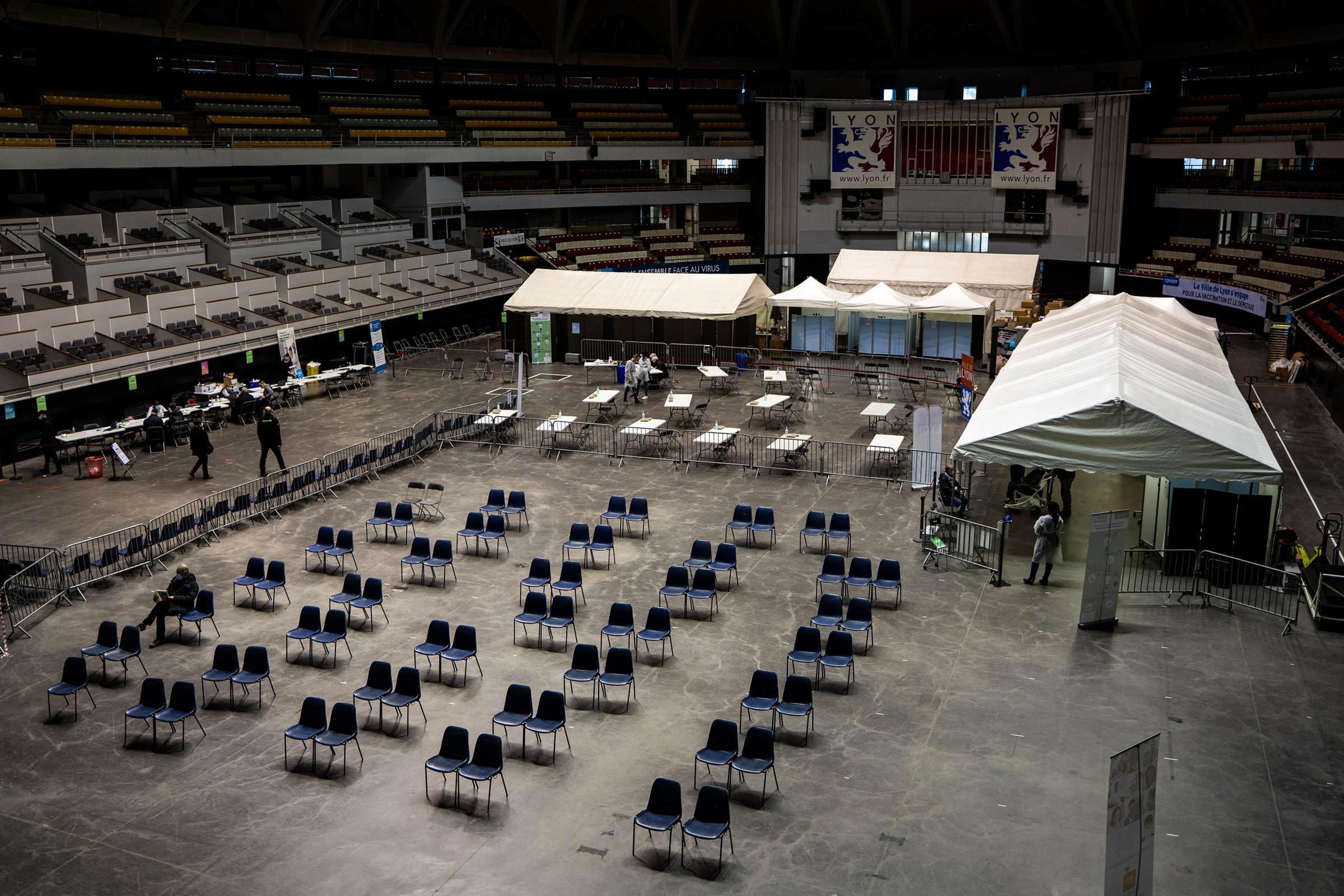
That antipathy greatly complicates mass immunization, given that of the three authorized vaccines in the E.U, two are manufactured by American pharma giants Pfizer and Moderna—and overseen by a government that many far-right and far-left French have portrayed as being intertwined with big business. Deepening that suspicion in the minds of some, Macron hired the U.S. consultancy McKinsey last month to help it speed up France’s vaccine program.
Despite the harassment, the vaccine defenders refused to be cowed into silence. Les Vaxxeurs say that as the anti-vaccine talk has grown increasingly aggressive, they too have become more vocally active, trusting that their anonymity protects them from physical harm. “We like to think that these are only words, and that they will stay words,” one member told TIME on the encrypted call.
Lacombe, for her part, is still deeply shaken at the campaign against her last year, but continues to speak frequently in favor of accelerating vaccines, and was awarded with the Legion of Honor, France’s highest civil honor, last month. “It is very, very important that we do not shut up when we are harassed,” she says. “What we are saying about the vaccines is true, with science.”
More Must-Reads from TIME
- Cybersecurity Experts Are Sounding the Alarm on DOGE
- Meet the 2025 Women of the Year
- The Harsh Truth About Disability Inclusion
- Why Do More Young Adults Have Cancer?
- Colman Domingo Leads With Radical Love
- How to Get Better at Doing Things Alone
- Michelle Zauner Stares Down the Darkness
Contact us at letters@time.com